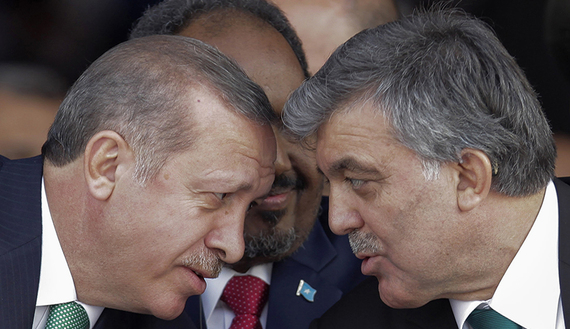The most recent meeting of the Central Executive Committee of the Justice and Development Party (AKP) seemed to confirm the idea that the party is not overly keen on seeing President Abdullah Gül extend his term in office, which is set to end this summer. Gül himself has stated, on more than one occasion, that the results of Turkey’s next presidential election are far from decided and are not in any single figure’s hands.
Despite all this, it appears the AKP would prefer to see current prime minister, Recep Tayyip Erdoğan, succeed Gül this year, and moving in to the Çankaya presidential palace. The Turkish street also appears also to have spoken in this regard. In a recent poll asking 2,500 Turkish people of different age groups and political backgrounds who they would prefer to see as president, Erdoğan emerged as the strong favorite.
The Turkish political situation today indicates a number of things, most importantly that AKP supporters not only want to see Erdoğan as Turkey’s next president, but also that they want him to be armed with wide-ranging powers. AKP supporters view Erdoğan as the undisputed master of the political game, and they believe he will be able to determine both the future of the country and the party. This will depend on two things, namely the forthcoming presidential elections and the ensuing adjustments and political calculations that must be made within the AKP itself. Most people believe Erdoğan’s decision to seek the presidency has been settled but will not be announced until the meal is ready to be served, so to speak.
It is an open secret that the AKP want to send Erdoğan to the Çankaya presidential palace and his forthcoming decisions in this regard will decide the fates of many in the AKP, including Gül himself. The outgoing president, no doubt, wants to know precisely what his future role and position in both the party and Turkey at large will be after he leaves office. He wants to know just what Erdoğan is prepared to offer him to smooth his path to the presidency, with many believing Gül could be offered the opportunity to represent Turkey on the international stage, perhaps at the UN.
However, even if Erdoğan does become president, he is still faced with a number of tough tests, particularly as there are only ten months between the presidential elections in August and the general elections in June 2015. That would give Erdoğan just ten months to determine the future strategy of the AKP for the coming era.
A President Erdoğan would leave the post of prime minister empty, so who would succeed him as prime minister for this ten-month period? He would also have to resign as AKP leader, so who would succeed him to that post and, more importantly, would it be the same person as the prime minister? Many are speculating that two separate figures will be chosen; a partisan figure to head up the government, and another AKP leader to head up the party during the transitional period.
But who could be trusted with these difficult tasks? Who will accept serving as an interim “custodian” leader who would leave office after ten short months?
This crisis of the ‘shadow leadership’ is the biggest concern for Erdoğan today. He announced he would be looking for a prime minister for 10 months only and this could anger the party that has endorsed his presidential ambitions, particularly if it sees that Erdoğan is abandoning the AKP at a time it is facing difficult internal and external struggles and gearing up for nationwide elections.
Peripheral wars within the AKP may also flare up if Erdoğan were to step down as leader, something that could potentially turn all his political calculations on their head. The current prime minister is also well aware that expanding the powers of the president and seeking to transform Turkey into a quasi-presidential political system will not be an easy task at the best of times, not least if the AKP is embroiled in internal disputes.
There is another possibility, and the solution, from Erdoğan’s point of view, could be seeking to integrate the parliamentary and presidential elections at the last moment, but before their legal and constitutional timeframe runs out. This would similarly be a hard sell, but Erdoğan could seek to solve his problems this way.
One other possibility which has been practically ruled out until now would be for Erdoğan to surprise us all by shrewdly and skilfully abandoning his presidential ambitions in order to protect the AKP’s continuing rise. He could seek to return everything to square one, perhaps by seeking to overturn term limits within the AKP. This is a move Erdoğan could make if he believes that his presidential ambitions will destroy everything he sought to build, something that has arguably happened with former prime ministers who became presidents, such as Turgut Özal and Süleyman Demirel.
Kemal Kılıçdaroğlu, head of the opposition Republican People’s Party (CHP), is not happy with how the presidential elections are shaping up and has been stressed that Turkey is too big a country for its future to be unilaterally decided by Gül and Erdoğan. However, he is ignoring the size of the crisis that has engulfed the Turkish opposition, with the latest poll showing that both the secular left-wing and the nationalist right-wing are rallying behind figures such as former army chief İlker Başbuğ, rather than his own faltering party. In my view, the Turkish opposition parties are over-reliant on the Gülen Movement, which explains their weak performance at the recent local elections.
